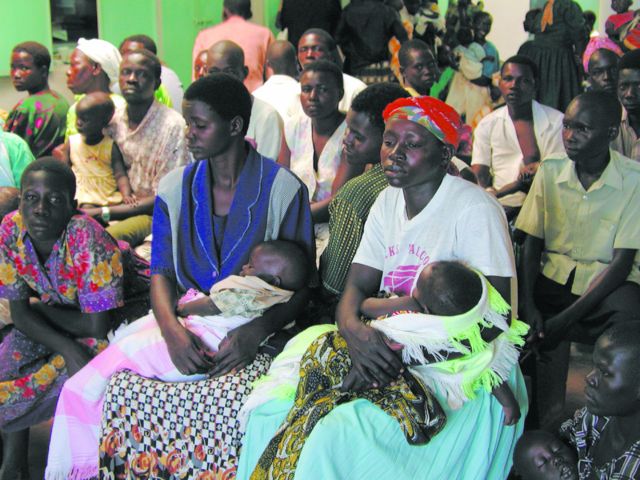rabble is expanding our Parliamentary Bureau and we need your help! Support us on Patreon today!
Canadians have had ties to Uganda for many decades. The east African country won its independence from imperial Britain in 1962 and Canada established diplomatic relations almost immediately. Throughout Uganda’s turbulent, often violent history, many Canadians have found their way to the country, while thousands of Ugandans have studied and settled here.
When Idi Amin seized power and peremptorily expelled 80,000 Asians from the country in 1972, Canada was among those who came to their rescue. More than 6,000 refugees were accepted by Canada. This initiative remains pertinent today. It was Canada’s first effort in relocating significant numbers of non-European refugees, and it is still universally hailed as a great success.
Many Canadians, led by Adrian Bradbury, have been active in the interminable battle against the psychotic Lord’s Resistance Army, which began its depredations in northern Ugandan; Mr. Bradbury has now moved to Uganda to continue his good work. At the same time, the Stephen Lewis Foundation has close working relations with the Ugandan Grandmothers group, which had in turn been encouraged by the foundation.
Last month, another Canadian helped make a deep impact on Ugandan public life. Noah Novogrodsky, the founding director of the International Human Rights Clinic at the University of Toronto Faculty of Law and now co-Director of the Centre for International Human Rights Law an Advocacy. Prof. Novogrodsky is also professor of law at the University of Wyoming has been adviser in a lawsuit in Uganda that sought the fulfilment of health rights for expecting mothers.
Uganda’s health system, once relatively impressive, is in crisis, with much of its funding stolen. Women, as always, pay much of the penalty. As many as 17 women die in childbirth every day in Uganda; most deaths occur due to lack of basic medicines or access to Caesarean sections. In 2011, the families of two women who died in childbirth and the Centre for Health, Human Rights and Development (CEHURD) filed a lawsuit against the Ugandan Attorney-General in Uganda’s Constitutional Court, arguing that the government’s failure to provide basic maternal health services violates the Ugandan Constitution. Prof. Novogrodsky was a legal and technical adviser to CEHURD.
They lost. In 2012, the Constitutional Court ruled that issues relating to health rights were “political questions” that the judiciary had no authority to address. It dismissed the case.
But on Oct. 30, Uganda’s Supreme Court struck down the Constitutional Court’s judgment, meaning the original case will now be heard on its merits. According to Mr. Mulumba Moses, CEHURD’s executive director, “The judiciary has shown that it is awake to the life-and-death struggle pregnant women confront when they deliver.”
But the decision has even wider, more exciting consequences. The Supreme Court’s judgment did more than reopen the courts to women suffering from a lack of basic maternal health services. It also sent a powerful message across all of Africa about the important role the judiciary has in safeguarding the Constitution more generally. In Uganda, the Chief Justice urged that “the judiciary should be an active participant in the judicial process ready to use law in the service of social justice through a proactive goal-oriented approach.”
Given the way the Constitution has been abused by so many of Uganda’s leaders, this was practically revolutionary. We can take for granted that President Museveni—- president now for no less than 29 years — was not amused. He’s one of those once-impressive African leaders who’s grown increasingly autocratic and eccentric as the decades fly by.
But Prof. Novogrodsky is understandably pleased. As he puts it, “The decision is significant because it confirms the independence of the judiciary and the fundamental importance of social and economic rights. In time, this case could become known as the Brown v. Board of Education of East Africa. Put simply, the decision reminds us that women’s lives matter.” Brown v. Board of Education, in which the U.S. Supreme Court ruled against separate schools for blacks and whites, reminded the United States that black American lives mattered.
Another CEHURD member, Nakibuuka Noor, put it this way: “We know that this judgment will not completely turn around the quality of maternal health services in Uganda but we are very confident that it represents real progress in the fight to ensure that no pregnant woman in Uganda dies while giving life.”
The timing of the judgment is critical. Uganda will hold elections in early 2016. CEHURD has already called on the government to increase funding for health care and urged all candidates to prioritize the delivery of health services in their campaign platforms.
Given the wretched record of the Museveni administration in so many areas — stealing money meant for the health system, beating up opponents, plundering neighbouring Congo, viciously targeting gays, changing the Constitution in order to extend his presidency, and much more — excessive optimism would be premature. But as a rare victory for justice, it could well be a major step forward for a country repeatedly betrayed by its own leaders.
Canadians can fully empathize with celebrating Ugandans. Citizens here are only too aware of the critical role of an independent judiciary in the face of a government that remains indifferent to the Constitution.
rabble is expanding our Parliamentary Bureau and we need your help! Support us on Patreon today!
Image: Wikimedia Commons



